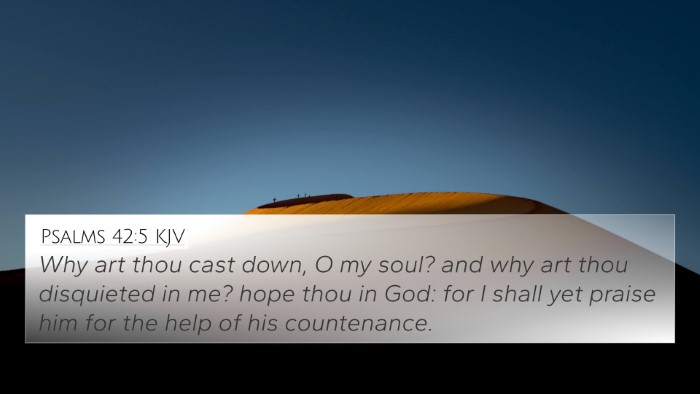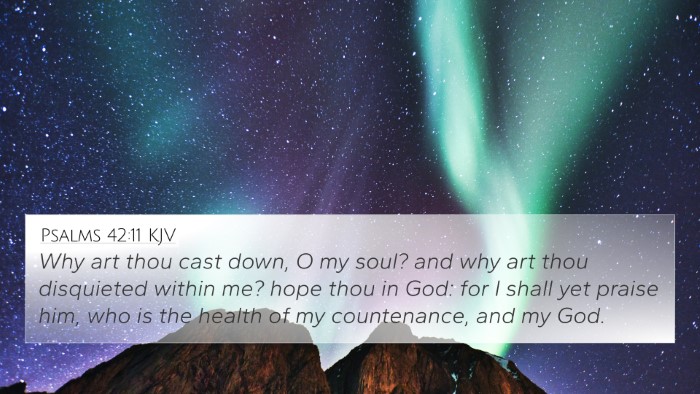Lamentations 3:20 - Meaning and Insights
Lamentations 3:20 states, "My soul has been rejected from peace; I have forgotten happiness." This verse reveals the deep anguish and despair that can grip a person's heart, particularly in times of trouble. Drawing from various public domain commentaries, we can glean a more profound understanding of the text and its implications for our spiritual lives.
Context of Lamentations
The book of Lamentations is a poignant expression of sorrow, primarily attributed to the prophet Jeremiah. Written in the aftermath of the destruction of Jerusalem, the text captures the collective grief of a nation. This context enriches our understanding of Lamentations 3:20 as it highlights the depths of despair experienced by the Israelites.
Insights from Matthew Henry
According to Matthew Henry, this verse reflects the profound sense of alienation from God that the speaker feels. He emphasizes that the loss of peace and happiness is a spiritual plight that many face, particularly when they feel the weight of their sins. Henry suggests that this sorrow leads to introspection and a longing for reconciliation with God.
Insights from Albert Barnes
Albert Barnes elaborates on the idea that forgetting happiness is a result of overwhelming sorrow. He points out that such despair can lead to a sense of hopelessness, where the speaker feels disconnected from joy and peace. Barnes encourages readers to consider the importance of remembering past blessings as a means of counteracting despair.
Insights from Adam Clarke
Adam Clarke notes the psychological implications of this verse, explaining that the soul's rejection from peace symbolizes a deep inner conflict. Clarke highlights that this verse serves as an acknowledgment of human suffering and a reminder of the need for divine intervention. He emphasizes the necessity of turning back to God for restoration and solace.
Biblical Cross-References
This verse can be cross-referenced with several other scriptures that elucidate similar themes of longing, despair, and the quest for peace:
- Psalms 42:11 - "Why are you cast down, O my soul, and why are you in turmoil within me?"
- Psalms 30:5 - "Weeping may endure for a night, but joy comes in the morning."
- Isaiah 26:3 - "You will keep him in perfect peace, whose mind is stayed on You."
- Jeremiah 29:11 - "For I know the plans I have for you, declares the Lord, plans to prosper you and not to harm you, plans to give you hope and a future."
- Philippians 4:7 - "And the peace of God, which surpasses all understanding, will guard your hearts and your minds in Christ Jesus."
- Matthew 11:28 - "Come to me, all who labor and are heavy laden, and I will give you rest."
- Romans 15:13 - "May the God of hope fill you with all joy and peace in believing, so that by the power of the Holy Spirit you may abound in hope."
Thematic Connections
The themes of despair and hope run throughout Scripture, providing a framework for understanding Lamentations 3:20 in light of both the Old and New Testaments. The intersection of sorrow and joy is prevalent in many biblical narratives, and it encourages believers to reflect on their emotional and spiritual states in tandem.
- Despair and Restoration: The notion of God's restoration is crucial for understanding despair. Just as Lamentations reflects the mournful cry of its author, the subsequent messages throughout the Bible reveal God's character as the restorer of joy.
- Hope in the Midst of Suffering: Verses like Romans 5:3-4, which speak about suffering producing endurance and character, resonate with the message in Lamentations.
- God's Faithfulness: The persistent theme of God's faithfulness in the midst of trials is seen in verses such as 2 Timothy 2:13, wherein we are reminded that even when we are faithless, God remains faithful.
Conclusion
Lamentations 3:20 serves as a poignant reminder of the human experience of sorrow and the profound need for divine peace and joy in our lives. By exploring insights from public domain commentaries, cross-referencing with other relevant scriptures, and identifying thematic connections, we gain a richer understanding of God’s promise to restore joy to those who seek Him amidst their pain.








